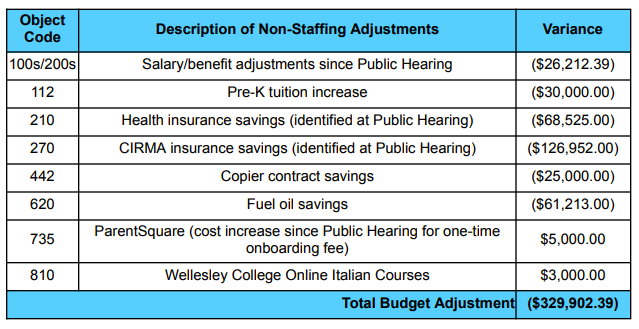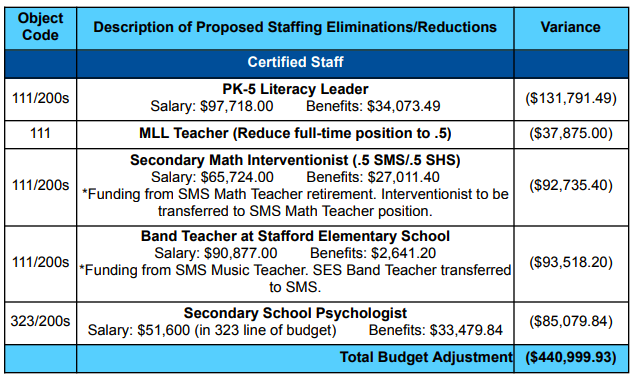BOE Approves Reduced Budget, Using Debt Service Funds to Keep Positions
- Theresa Cramer
- Apr 24, 2025
- 3 min read
Those of us who looked at the agenda for Wednesday’s special Board of Education (BOE) meeting ahead of time fully expected a pretty somber meeting. Following the failed budget referendum earlier this month, the Board of Finance instructed the Board of Education to reduce its budget proposal by $984,803.33. The agenda for the meeting detailed a number of reductions that, as one board member put it, “eliminated positions, not people.” While the board members who were present — Chris Paradiso (R), Eileen Bartlett (R), Shana Boland (R), Sara Kelley, (D), and Jennifer Biedrzycki (D) — voted unanimously to approve this new budget, they did so with some unexpected amendments.
Some of the eliminated positions were open, or would become open through retirements, but not all of them. For instance, the literacy leader position was open, and its responsibilities will be shifted to the Chief Academic Officer. An open position in the Pupil Services Department will be eliminated, while a multi-language learning (MLL) teacher was reduced to a part-time position. The athletics secretary position was eliminated, while one speech-language pathologist assistant would not be replaced after retirement, and another was reassigned to an open paraeducator position, removing the two SLPA positions.
Click main image to enlarge.
The staff elimination that seemed to bug the board members the most was the elementary school band teacher. The teacher in that position would be moved to the middle school, and a non-tenured teacher would be let go. Several board members spoke about the importance of this position and how eliminating it would put students behind surrounding towns. Interim Superintendent Dr. Laura Norbut pointed out that these kinds of cuts ultimately result in funds leaving Stafford as more students opt to attend technical and vocational-agricultural programs, and the district is required to pay the tuition at those schools.
However, things quickly took a surprising turn.
BOE Chair Kelley noted that the school budget has roughly $490,000 budgeted for debt service to pay for part of the solar panel lease. This money does not go straight to the solar company, but back to the town. She also stated that, to the best of her knowledge, there is no signed Memorandum of Understanding (MOU) with the town regarding this matter and that she had requested documentation. She also said that she had informed First Selectman Bill Morrison and Board of Finance Chair Steve Geryk that she would be bringing this up for conversation at the meeting.
“I was accused of having disregard for the town,” said Kelley. However, she said she felt it was Important that taxpayers know this amount was in the budget and was being paid to the town. She also requested documentation to show the money was being applied directly to the solar lease payments.
With all of this in mind, Kelley asked the board if they would discuss the possibility of repurposing the money already budgeted for debt service to maintain some of the positions identified for elimination. Bartlett said she completely agreed that “we should be putting that money back into our schools and our staff.”
Biedrzycki pointed out that the schools had been charged with absorbing additional costs of the School Resource Officer, town audit, and pension plan administration this year. She noted that the $490,000 was a large sum to be given based solely on a “gentleman’s agreement.”
The board began discussing which portion of the $490,000 budgeted for debt service they would be comfortable using to offset the cuts in other areas of the budget. After a brief discussion, they settled on $400,000. The question then was what positions could they add back. They decided to leave all of the non-certified positions on the chopping block, as well as the literacy leader. Instead, they prioritized keeping the MLL full-time, as well as keeping the math interventionist, band teacher, and the secondary school psychologist positions.
Click main image to enlarge.
This, along with the non-staffing budget adjustments, actually left the BOE with approximately $15,000 to allocate toward other line items that may require it. To be clear, this budget still represents a $984,803.33 reduction from the budget voted on at the referendum, but it utilizes funds from one line item to offset others.
The question now is whether the town will be able to produce a signed MOU regarding the solar lease payments. If it does, the BOE will have to once again revisit the cuts originally presented in this version of the budget. Furthermore, will the town vote to approve this latest version of the budget? If not, Dr. Norbut said the next steps would be to consider increasing elementary school class sizes and increasing the sports transportation fees. The agenda also indicated that the district might need to reconsider which sports programs it offers, as well as the middle school technology refresh, which has already been scaled back.


















